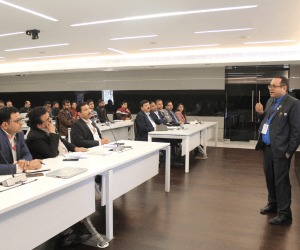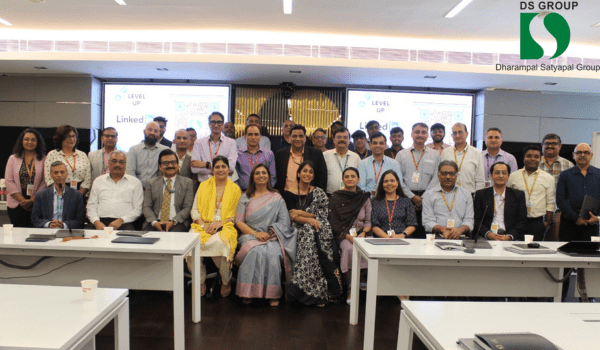Imagine a sales application that doesn’t just track numbers, but also understands one’s motivations and delivers personalised nudges to boost his/her performance. This isn’t science fiction; it’s the reality for the salesforce at DS Group, a leading FMCG conglomerate. Their innovative ‘nudge’ application, powered by AI, is just one example of their progressive approach to talent development.
Unlocking the secret sauce
The application starts by learning about each salesperson’s unique drivers. Do they thrive on competition and seek to top the regional leaderboard? Or are they primarily motivated by financial rewards? This information is gathered through various sources, including past performance data, self-reported preferences, and even informal feedback from colleagues.
Armed with this understanding, the application delivers targeted nudges at the start of each workday. For the financially motivated salesperson, it may highlight their current SKU sales, showcasing the additional incentive they could earn by exceeding their target. For the leaderboard climber, it may suggest specific actions they can take to climb higher in the rankings, such as focusing on specific product lines or engaging in targeted customer outreach.
The application doesn’t just focus on numbers; it also considers psychological factors. For example, it may nudge a salesperson experiencing a slump with encouraging messages or remind them of past successes. Conversely, it may offer a friendly challenge to a high performer, keeping them motivated and engaged.
“The AI technology individualises the learning experience and operates on a self-paced model. The diverse modules and mobile platform cater to various preferences and schedules, empowering employees to learn at their convenience.”
Simin Askari, senior vice president, corporate HR and business excellence, DS Group
The application doesn’t rely solely on extrinsic motivators such as bonuses or recognition. It also incorporates positive reinforcement, celebrating achievements and milestones along the way. This fosters a sense of accomplishment and intrinsic motivation, further driving individual performance.
While still relatively new, the ‘nudge’ application has shown promising results. Early data indicates an increase in sales performance and overall employee engagement among the salesforce. The company continuously analyses and refines the application based on user feedback and performance metrics.
The three-pronged foundation: A culture of growth
The ‘nudge’ application is just one facet of DS Group’s comprehensive talent development strategy. Their three-pronged approach, encompassing regular assessments, personalised IDPs, and clear development roadmaps, provides a solid foundation for employee growth.

The journey begins by understanding and identifying the competencies required for each role and assessing existing skill gaps. The Digital Learning Academy, powered by AI, plays a crucial role. Its integrated competency framework allows employees to identify their areas of strength and weakness, accessing personalised training modules to bridge the gaps.
“The AI technology individualises the learning experience and operates on a self-paced model,” explains Simin Askari, senior vice president, corporate HR and business excellence, DS Group. “The diverse modules and mobile platform cater to various preferences and schedules, empowering employees to learn at their convenience.”
Furthermore, regular potential assessments by third-party firms identify skill gaps and lead to the creation of IDPs with targeted training. This empowers employees, giving them a sense of control over their career paths, as Askari elaborates: “Someone in sales aspiring to move into marketing can access specific role requirements and undertake additional learning to bridge any gap in skills.”
Personalising development paths
Several development initiatives are designed based on employees’ hierarchical levels. The ACE programme, for instance, aims to establish a robust leadership pipeline by targeting MBA graduates from prestigious institutions such as the Indian Institutes of Management (IIMs). Referred to as ‘acers’, these individuals undergo a six-month induction programme exposing them to various business facets. They are then assigned strategic roles alongside directors, heads of departments, and functional heads as strategic management associates.

“Acers receive unique treatment with clearly-defined development paths,” reveals Askari. “Regular assessments and specialised training sessions groom these individuals identified as potential future leaders.”
To further upskill the existing workforce, the company has launched the DS Learning Academy (DSLA) on the ‘Disha’ platform. Individuals can identify and pursue aspirational goals, charting their own career paths. Additionally, internal job-rotation policies encourage employees to explore various departments, gaining insights and returning with enhanced experience.
“Many of our employees have grown into their roles through dedication,” asserts Askari. “While they are experts, they may not have received the latest education. Therefore, we bring in external talent while simultaneously developing our existing staff.”
The distance-learning policy allows individuals to pursue certifications and diplomas, particularly those who may not have had the opportunity earlier. The company provides comprehensive financial assistance and partners with select international and Indian universities, offering certificates, diplomas, and even degrees.
Investing in the future
DS Group recognises the importance of supporting employees’ families. From the sixth to the twelfth grade, they run a scholarship programme for both white-collar and blue-collar employees, recognising academic achievements.
Selection for training programmes, especially leadership development, is cadre-based, focusing on individuals assuming leadership roles. These programmes range from one to five months, addressing specific skill development areas. The ‘First Time Manager’ programme, for instance, equips individuals with skills to transition from individual contributor roles to overseeing teams.
Another initiative, the ‘High-potential (Hypo) Development’ programme, assesses individuals on the verge of taking on the next role. “In the past six months, we have assessed around 115 individuals in this category,” says Askari.
Employees at grade M1 and above, already in leadership roles, participate in interventions starting from April, spanning several months.
Leveraging technology for impact
Technology plays a strategic role in DS Group’s talent management practices. They are implementing a new HRMS, featuring AI-enabled functionalities to enhance various aspects of HR practices, from creating job descriptions to streamlining onboarding.
The new performance management system (PMS) enables online goal setting and feedback mechanisms, facilitating a streamlined and automated approach.
By leveraging this three-pronged approach and embracing technology, DS Group is building a future powered by its talent, ensuring its continued success in a rapidly evolving landscape.


